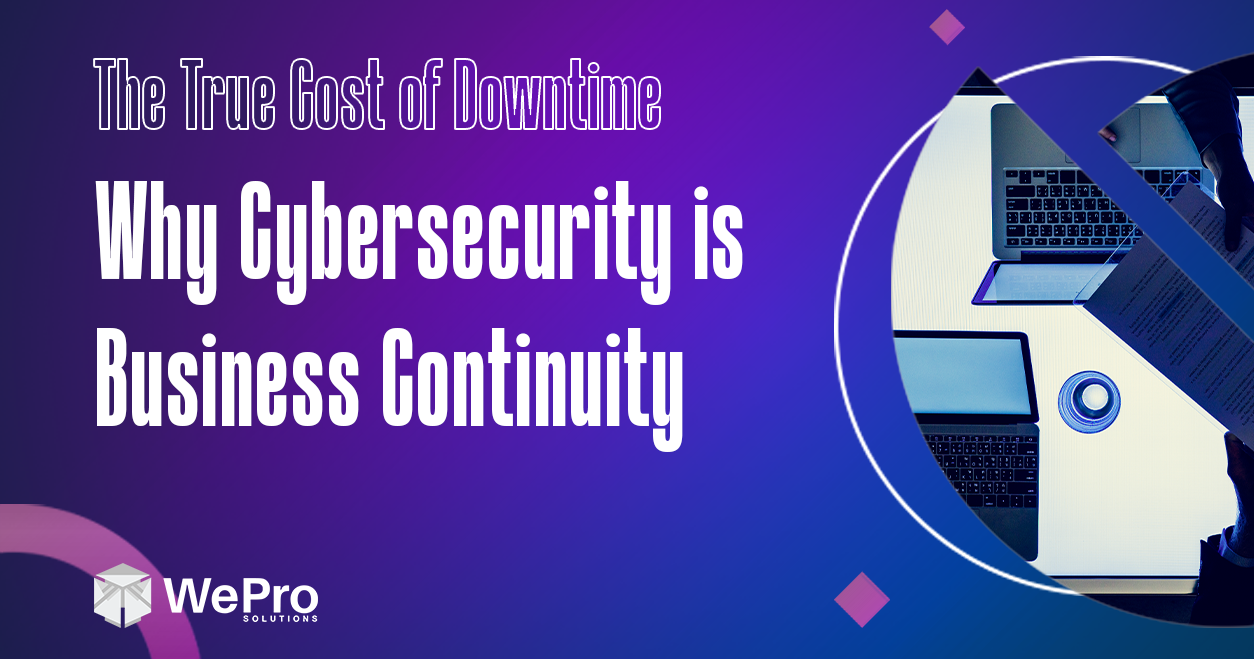
When business is moving forward as planned, it’s easy to get into your groove and not think about anything other than getting the job done. But what happens when something interrupts that flow?
Downtime – whether it’s your servers, your site, or your whole business – can have major impacts on your company. It’s not just an inconvenience, it’s a problem both financially and operationally.
That’s where business continuity and cybersecurity come into play. Both are key factors in helping keep your business running as planned and getting it back online if something ever goes wrong.
To help protect your business, let’s break down the true cost of downtime and the importance of a good cybersecurity strategy, especially when it comes to business continuity.
Understanding Downtime
Like the name suggests, downtime is when any part of your business operations are unavailable, offline, or interrupted. This includes your software, operational systems, website, or anything of the sort.
Within that you have planned and unplanned downtime:
Unplanned downtime is the one that typically has the most negative impact on your business, especially because you can’t warn people about it and have no idea at first of how long it will take to resolve. Common causes of unplanned downtime include system failures, human errors, power outages, and cyberattacks.
While both of these can impact productivity and profits while things are offline, unplanned downtime also effects people’s perception of and trust in your company because you weren’t available when they sought you out and seem unreliable.
The Financial Impact
At its core, business is about money. Whether direct or indirect, downtime has costs associated with it that do impact your overall company finances.
Some of those direct costs include lost revenue while offline, as well as the price of recovery and whatever it takes to get things running again. Indirect costs include things like data loss that you have to recover, reinput, etc., but also the price of losing people’s trust and the harm downtime causes to your reputation.
While downtime can impact businesses at every level, it tends to have even bigger financial impacts on small businesses. This is because these teams are typically smaller, meaning they have fewer resources to anticipate and bounce back from downtime, leading to longer interruptions and possibly higher costs of hiring an outside team to get things fixed.
The Cybersecurity Connection
In today’s digital world, cybersecurity is a crucial part of keeping your business, employees, and customers safe. And just as technology is evolving, so are cyber criminals. They are getting smarter, and figuring out new ways to attacks businesses that cause major disruptions and are harder to come back from.
Some of the top cybersecurity threats businesses face nowadays that can lead to downtime include phishing scams, data breaches, and ransomware. These can lead to hackers gaining access to your data and systems, and either holding them hostage or wreaking havoc on them. And when this happens, your systems are typically either unavailable or unsafe for people to use for fear for of their information falling into the wrong hands.
But the stronger your cybersecurity measures are, the lower your downtime risk is. With good cybersecurity defenses, it’s harder for hackers to gain access to your systems, meaning less chance of interruptions.
Business Continuity Starts with Cybersecurity
Having a strategy in place to keep your company running during and after any type of downtime is where your business continuity plan starts. And part of that plan involves your cybersecurity measures and what your company has in place to prevent and work through any cyber-attacks you may face.
While there are several cybersecurity measures you should take to help fully protect your company, some key practices that help prevent downtime and factor into your business continuity plan include:
By putting these cybersecurity practices into place in your company, you’re strengthening your business continuity plan and operations as a whole.
Unexpected downtime is just that – unexpected and can happen at any moment. Whether it’s a cyberattack, human error, or system failure, the impact it can have is massive. But with the right cybersecurity measures in place, you can minimize those risks, recover faster, and keep business running smoothly.
How We Can Help
As a managed IT service provider, we understand the importance of good cybersecurity practices as well as the impact downtimes can have on your business. We can help ensure that your cybersecurity practices are up to par and are a key piece of your business continuity strategy, so you’re protecting your company on every front.
If you’re looking for an IT partner to help strengthen your business, send us a message! We’d love to work with you.